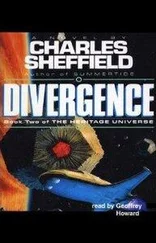The Sino Consortium had planned to launch a giant station, all their own, in mid April. It was their gesture of superiority, their finger raised to the United States: You had your day, we are the top dogs now!
Saul, chilled through his multiple layers of clothes, turned and headed aft. Today the Sino Consortium, if the reports reaching Saul were accurate, would have trouble launching a marble into space. So, unfortunately, would the United States.
The Indian Head facility was in mothballs, and had been for a quarter of a century. Only strenuous local politics had allowed its continued existence. According to the report pulled out for Saul before he left, the pre-supernova staffing of Indian Head had been at a caretaker level of twenty.
So why were a hundred people and more crowding the jetty as he came ashore?
Saul knew the answer when he saw the crowded ships at neighboring berths and the insignia on some of the waiting group. He counted six full captains. Word of his trip had spread. Navy forces along the whole stretch of the Potomac from here to Washington had been placed on full alert.
He swore to himself. He had seen it again and again in the past two years. Nothing he had been able to say or do would stop it.
You asked an off-the-cuff question during a briefing, maybe about government personnel grades today compared with twenty years ago. Sometimes you were just making conversation. Your casual inquiry was noted and passed on. As it went down the line, it developed momentum. Soon it was a “presidential directive.”
One week later, a massive report appeared on your desk. It was a comprehensive review of hiring and promotion policies throughout the whole of the federal government. It was stuffed with historical facts and tables and complicated charts, and it represented hundreds or thousands of hours of intense effort. Half a dozen staff members nervously awaited your request for a briefing.
And you? You didn’t remember asking the question.
Yellow electric bulbs had been strung on wooden posts along the quay to provide an improvised lighting system. Saul walked the line of waiting personnel, acknowledging their salutes. He always felt a little bogus in the presence of the military. Because he had seen no service himself, he had been advised early in his political career to adopt a strongly pro-military attitude. He had done so, urging better appreciation for the peacetime role of the services. He really believed in that, but maybe he had overdone it. At any rate, he now seemed to be considered “one of them” by every serviceman and -woman.
Yasmin Silvers was standing in the group at the end of the receiving line. The weak yellow glow of the lights showed a strange look on her face. Bewilderment?
That would be reasonable. Saul felt sure that for the past few hours everyone had been asking her, directly or indirectly, the reason for the President’s sudden decision to visit Indian Head.
Next to Yasmin a grizzled veteran stood at rigid attention. In spite of the cold he was in full uniform and wearing no overcoat.
“Welcome to Indian Head, Mr. President.” The salute was slow and a little arthritic. “I am Captain Kennecott, OIC.”
“At ease, Captain.” Saul decided to put Kennecott out of his misery — and move the old man inside before they had a case of hypothermia on their hands. He put Kennecott’s age in the early eighties. The commodore must be a reemployed annuitant, protected in his position by the Gray Rights laws. But no laws protected the old from pneumonia. “I would like you to provide me a full inspection of the base tomorrow morning, Captain. For tonight, though, I must meet privately with Ms. Silvers, and I plan no other functions. Everyone can be dismissed — and let’s all get inside before we freeze.”
“Yes, sir.” Kennecott led Saul up a steep flagstone path cleared of snow, and went into the back of an old building of red brick. As they entered the ambient temperature rose fifty degrees. “So far as sleeping accommodations are concerned, and meals …” Kennecott turned to stare uncertainly at the six security staff who dogged Saul’s footsteps.
“Whatever the kitchen happens to have available. I will need a room for private discussion with Ms. Silvers while I eat, but what I eat is of no importance. As for sleeping, do you still have visitors’ quarters on base?”
“Yes, sir.” Captain Kennecott blinked watery blue eyes at Saul. “Here in the Officers’ Club. But, Mr. President, the rooms here in the Mix House are old and primitive and unused for many years. The BEQ’s, Bachelor Enlisted Quarters, are even worse. They have never been updated for an integrated service. There was no budget for it.”
“Do you have running water?”
“Yes, sir. The base has its own generators and storage tanks.”
“Then we are better off than most people in this country.” Saul looked around. He knew where Captain Kennecott was going: to an invitation to stay at his own house, which Saul did not want at all. “I’ll stay here in the Officers’ Club. Do you have a room right here where I can hold private meetings?”
“Yes, sir. And the kitchen is already open.” Kennecott led them through the building and up one floor, to a blue-walled room holding a long oak table and twenty chairs. “If this would do?” He ran a gnarled hand lovingly along the smooth, still-polished surface. “This was our conference room, Mr. President, back in the days when this base still had a major mission as a naval propellant test center.”
“This will do beautifully. Thank you, Captain.” Old sailors didn’t die. They went down with their bases.
“Thank you, sir. May I say what an honor it is to have you here? In one hundred and twenty-eight years since this facility was established, this is only the second visit from a sitting President.”
As Captain Kennecott left, Yasmin Silvers nodded to Saul. “You really made his day.”
“I hope so.”
“Would you consider making mine?” Her voice changed. “By telling me what is going on?”
No “sir,” no “Mr. President.” Saul heard bottled-up bewilderment and unhappiness coming out at him. And he didn’t know why.
“You mean, why did I decide to visit Indian Head?”
“I don’t mean that at all. I mean, why did you arrange for me to go down to the Q-5 Syncope Facility, and not tell me that something peculiar was going on there? I gather all sorts of things happened downriver tonight. If I hadn’t been stuck here because of the weather, I’d have landed in the middle of it.”
“You think I set you up? That I knew what was going on there, but I sent you without telling you?”
“Didn’t you? Yes, I do think that. I feel like an experimental animal.”
“Christ, Yasmin. What kind of sadist do you take me for?” It was a reaction not to her anger, but to her lack of trust. That hurt. “You have a good brain. Use it, and think. Did I arrange for your brother to stick a knife into that twisted bastard rapist Lopez? Did I arrange for your brother to be iced down in Q-5, just so I could send you there? For your information, I didn’t know that anything was happening downriver tonight. And I still have no idea what’s going on there.”
When Saul was angry he became cold and remote, not hot and loud. He had not raised his voice. That was just as well, because his final words came at the same time as the perfunctory knock on the door and the arrival of their food.
Did it really take nine people to serve bean soup followed by broiled fresh fish with potatoes and carrots? It did if you happened to be the President, and all the cooks on the base wanted to be able to tell their friends that they had served you dinner.
He and Yasmin waited in awkward silence as the plates and serving dishes were set out, along with glasses and a bottle of white wine that he had not asked for. She had an appalled and stricken stare on her face. She knew she had gone way over the mark for a presidential aide. And she had been wrong in her accusations. He knew it, too, but for the moment he could say nothing without making things worse.
Читать дальше












